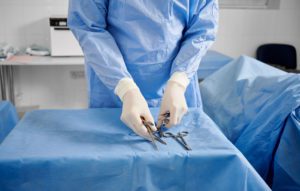If you’re considering starting a plastic surgery practice, you’re in the right place! Plastic surgery is a growing industry, and there’s plenty of room for new players.
In this article, we’ll walk you through the steps on how to start a plastic surgery practice.
So what are the steps?
- Create your plastic surgery practice business plan
- Get the necessary funding
- Get the equipment you need to be successful
- Find the perfect location
- Hire the right staff
- Build the perfect plastic surgery marketing plan
Create Your Plastic Surgery Practice Business Plan
Creating a business plan is essential to starting any business. In order to create your plastic surgery business plan, you will need to do the following:
Write a Description of Your Business
This should include information such as what type of plastic surgery you will offer, the target market you plan to serve, the type of business you will have, and what makes your practice unique.
Choose What Type of Plastic Surgery You Will Offer
There are many different types of plastic surgery procedures you can offer. You will need to decide which ones you want to offer at your practice.
Some of the most popular plastic surgery procedures include:
- Breast augmentation
- Liposuction
- Nose job
- Facelift
- Tummy tuck
- Botox injections
- Labiaplasty
For instance, Dr. Steinberg is a successful plastic surgeon who specializes in a specific practice of plastic surgery known as labiaplasty. This is just one facet of plastic surgery, and it important to decide what you will specialize in before moving forward with starting your own practice.
Choose the Type of Business You Will Have
The three main types of plastic surgery businesses are:
- Private practices
- Group Practices
- Hospital-based practices
Private Practices
If you decide to open a private practice, you’ll be the sole owner of your business. You’ll have complete control over all aspects of the business, from setting prices to hiring staff.
The downside of owning a private practice is that you’ll also be solely responsible for all the costs associated with running the business. These costs can add up quickly, so it’s important to make sure you have the financial backing to sustain a private practice.
If you are going the private practice route, it might also benefit you to seek help from a medical marketing agency to assist with:
- Understanding client needs
- Accessing marketing channels
- Communicating with physicians
Group Practices
A group practice is similar to a private practice, but there are multiple owners. This type of ownership can help spread the costs associated with running a business and also offer some built-in marketing (people are more likely to visit a practice with multiple surgeons).
The downside of owning a group practice is that you’ll have to share decision-making with the other owners. This can sometimes lead to disagreements and conflict within the business.

Hospital-based Practices
If you decide to open a hospital-based practice, you’ll be employed by a hospital. This type of arrangement can offer some advantages, such as a built-in clientele and marketing opportunities.
The downside of hospital-based practices is that you’ll have less control over your work schedule and the types of procedures you’re able to perform. You’ll also be at the mercy of the hospital’s budget.
Create a Financial Plan
Your financial plan details your projected income and expenses. This will help you determine how much money you will need to start your practice and how much profit you can expect to make.
Conduct a SWOT Analysis
A SWOT analysis is a tool that will help you to identify the:
- Strengths,
- Weaknesses
- Opportunities
- Threats
This is an important step in creating your business plan as it will help you to understand the challenges and opportunities you’ll face as you get started
Get the Necessary Funding
One of the most important aspects of starting a plastic surgery practice is having the necessary funding.
This can come from a variety of sources, such as personal savings, loans, or grants. It’s important to do your research and find the right funding option for your specific situation.
There are many resources available to help you get started, so don’t hesitate to ask for help.
Loans
If you’re looking for a loan, there are a few things to keep in mind. Make sure you shop around and compare interest rates from different lenders. It’s also important to be aware of the terms of the loan, including the length of time you have to pay it back and any penalties for missed payments.
Grants
There are a number of different grant funding opportunities. The government offers a variety of grants through its Small Business Administration, and there are also a number of private organizations that offer grants for new businesses.
Be sure to research all your options and apply for as many grants as you qualify for.
Personal Savings
If you have the personal savings to cover the costs of starting your practice, this can be a great option. This will allow you to avoid taking on any debt and will give you complete control over your business.
However, it’s important to make sure you have enough saved up to cover all the costs associated with starting a business, as well as any unexpected startup costs to consider.
Get the Equipment you Need to be Successful
In order to be successful in your plastic surgery practice, you will need the proper equipment. This includes:
- Surgical tools
- Medical equipment
- Office supplies
- Furniture
- Computers and software

When purchasing equipment, it is important to consider your needs and budget. You will want to make sure you have the necessary tools for performing procedures, as well as for sterilizing and storing equipment.
It is also important to have a comfortable and functional office space where patients can relax before and after their procedures.
Purchasing second-hand equipment may seem like a cost-saving measure, but it can be risky if the products are not in good condition. It is important to only do this from a trusted source. Ultimately, the success of your plastic surgery business will depend on the quality of your equipment.
By planning ahead and investing in the right equipment, you can ensure that your plastic surgery practice is off to a successful start.
Find the Perfect Location
One of the most important factors in starting a successful plastic surgery practice is finding the perfect location.
When choosing a location for your business, you’ll need to consider a variety of factors such as:
- Cost of rent
- Population size
- Competition.
Cost of Rent
The cost of rent is an important factor to consider when choosing a location for your plastic surgery practice. You’ll want to find a space that is affordable, yet still in a convenient location for patients.
Population Size
The population size of the area you choose will also be an important factor to consider. You’ll want to make sure there is a large enough population to support your business.
Competition
Another important factor to consider when choosing a location is the level of competition.
If there are already a number of plastic surgery practices in the area, you’ll need to be sure that your practice can offer something unique that will attract patients.
You’ll also want to make sure that the location you choose is accessible and has a good reputation.
Hire the Right Staff
A huge step in starting a plastic surgery practice is making sure that you hire the right staff. This includes finding:
- A plastic surgeon with proper qualifitions and certifications
- Nurses
- Support staff
It is important to take the time to interview potential candidates and to check their references thoroughly. It is also important to create a positive work environment that encourages teamwork and cooperation.
Hiring a Plastic Surgeon
In 2021, the average plastic surgeon performed 320 surgical procedures. This means that you’ll need to be sure you have a qualified surgeon who is able to handle a high volume of work. You’ll also need to make sure that your staff is adequately trained in plastic surgery procedures and safety protocols.
Hiring Nurses Nurses
Nurses play a vital role in the success of any medical practice. They are responsible for pre- and post-operative care, as well as helping to ensure that patients are comfortable and safe during their procedures.
When hiring nurses, you’ll want to make sure that they have experience in plastic surgery and that they are up-to-date on all of the latest safety protocols.
Hiring Support Staff
In addition to nurses, you’ll also need to hire support staff for your plastic surgery practice. This includes:
- Office staff
- Receptionists
- Administrative assistants.
These individuals will be responsible for keeping your practice running smoothly on a day-to-day basis.

Build the perfect plastic surgery marketing plan
When it comes to marketing your plastic surgery practice, it’s important to think outside the box and be creative. One of the best ways to get the word out about your business is to create a marketing plan that targets your specific audience. This is important to grow your plastic surgery practice. Here are a few tips for building a successful marketing plan:
Outline Your Marketing Strategy
This should include details on how you plan to attract new patients, as well as how you will retain current patients.
Some marketing strategies you may want to consider include:
- Developing a strong online presence
- Creating informative blog posts and articles
- Using social media to reach a wider audience
- Engaging in local community events.
Make Sure Your Website is Up-to-Date
Your website is your primary tool for marketing your practice, so make sure it looks professional and is easy to navigate. Be sure to include information about your services, team, and office location. You should also include testimonials from satisfied patients.
Use Social Media to Reach Potential Patients
Social media is a powerful marketing tool that can be used to reach a wide audience. Be sure to create profiles on all the major social networking sites and post regular updates about your practice. You can also use social media to run promotions and offer discounts on your services.
Make sure your profiles are up-to-date and include high-quality images of your work.
Develop a Strong Branding Strategy
Branding is key when it comes to attracting new patients. Some important branding elements to consider include your:
- Name
- Logo
- Website
- Social media profiles
- Business cards
- Tagline
Your branding should be consistent across all of your marketing materials, from your website to your business cards. By developing a strong branding strategy, you can make your plastic surgery practice stand out from the competition.
Invest in Advertising
Paid advertising can be a great way to reach new patients who may not have heard of you before. Choose wisely and target your ads towards people who are likely to be interested in cosmetic surgery.
Stay Active in the Community
Get involved with local events and organizations, and participate in charity work. This is a great way to raise awareness about your practice and connect with potential patients on a personal level.
In Conclusion
Starting a successful plastic surgery practice takes time, effort, and planning. By following these tips, you can set your business up for success from the start.
Have you ever thought about starting your own plastic surgery practice? Do you have any tips for starting your own practice? Let us know in the comments below!
Frequently Asked Questions
A: The cost of starting a plastic surgery practice will vary depending on a number of factors, such as the location of your practice, the staff you hire, and your marketing budget. However, you can expect to spend at least several thousand dollars on getting your business up and running.
A: The amount of time it takes to start a plastic surgery practice will also vary depending on the factors mentioned above. However, you can typically expect the process of starting your business to take at least several months.
A: Some common challenges of starting a plastic surgery practice include choosing the type of business you want to run, finding the right people to hire, developing a budget to start with, and getting the word out about your business.
A: To make your plastic surgery practice successful it is important to have the right equipment, staff, and vision in mind so that you can attract new clients while maintaining consistency.
A: There are many ways to attract new patients to your plastic surgery practice. Some of the most effective methods include using social media, developing a strong branding strategy, and investing in advertising.
A: If you are interested in starting a career in plastic surgery, the first step is to complete a residency program in plastic surgery. After completing your residency, you will then be eligible to take the board certification exam. Once you are certified, you can begin practicing plastic surgery.


